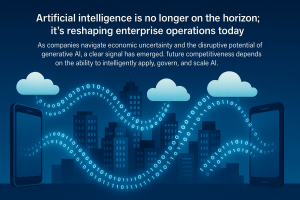Kubernetes has become the backbone of enterprise digital transformation. As mesh and other complex cloud architectures become mainstream, information technology professionals will need to lift, shift and alter countless legacy applications in order to run them over multiclouds that run Kubernetes everywhere.
Managing these containerized, orchestrated and virtualized multiclouds will require a new arsenal of intelligent cloud management tools that harness artificial intelligence. Many providers now offer sophisticated tooling that that embeds AI for intelligent, adaptive and automated management of hybrid, mesh and other complex cloud deployments.
AI’s growing role in cloud management management stems from its ability to automate and accelerate many tasks more scalably, predictably, rapidly and efficiently than manual methods alone. An emerging best practice, which many call “AIOps,” refers to use of embedded machine learning and other AI models to make software-defined networks continuously self-healing, self-managing, self-securing, self-repairing and self-optimizing.
AIOps advances
Advances in AIOps will enable DevOps professionals to assemble, deploy and manage containerized and serverless applications and data more rapidly across the multicloud. This new generation of tools can:
- Automate continuous log analysis, anomaly detection, predictive maintenance, root cause diagnostics, closed-loop issue remediation and other critical functions;
- Enable real-time monitoring, predictive analysis, root cause diagnostics and anomaly detection on system- and application-level events in IT infrastructure, and also in data, application and services at higher layers in the cloud computing stack;
- Reduce IT managers’ dependency on complex, brittle and fragile systems of rules and filters, thereby enabling more rapid detection, analysis and response to issues and events that might impact service levels; and
- Boost IT management staff productivity by cutting the time needed to detect and remediate incident, automatically reducing alert volumes, correlating and clustering alerts, streamlining cross-team response workflows, and capturing and sharing knowledge of how various issues were resolved.
As enterprises build out their Kubernetes-based multiclouds, they will be running more AIOps-enhanced network policy controllers at every node all the way out to the edges. Wikibon expects that more multicloud network backplanes will run on hyperconverged infrastructure platforms that incorporate embedded AIOps capabilities. These tools will support automated provisioning of the compute, memory, storage and bandwidth needed to supporting growing network traffic and more complex machine learning-driven closed-loop optimization patterns.
Security front and center
Multicloud security will become the essential core AIOps application. That’s because Kubernetes’ spread is spawning a vast, vulnerable and constantly changing “attack surface” that exposes enterprise IT assets to considerable security risks.
The chief risk factors with Kubernetes include its heterogeneous deployed distributions, the myriad application programming interfaces that its solutions present and the immaturity of security solutions that address diverse Kubernetes deployment and configuration scenarios. The unfamiliarity of Kubernetes technology among many security professionals complicates efforts to protect this platform in many enterprises, as does the need to apply patches in a timely, consistent fashion across both newer Kubernetes-based platforms as well to older, legacy cloud application environments with which they interoperate.
Kubernetes’ vulnerabilities are poised to proliferate rapidly unless AIOps and other capabilities are used to keep them in check. In the new era of elastic multiclouds, one might start with a small, easily secured Kubernetes cluster and then, seemingly overnight, be able to provision hundreds if not thousands of nodes and containerized apps that present alluring access paths for hackers and industrial spies.
AIOps-powered multicloud management tools can automatically discover and closethese security vulnerabilities, while also detecting suspicious traffic that may try to conceal itself through cryptography and other means. In next-generation software-defined networks, AIOps will drive continuous event monitoring, application-aware firewalling, intrusion prevention, anti-malware and URL filtering.
Wikibon expects that AIOps tool vendors will rapidly adopt an emerging open-source DevOps project called as Kubeflow. This will enable automated updating of security and other policies that were built in TensorFlow and other AI models to containerized network and policy management systems anywhere on the multicloud. Enterprise cloud managers should prioritize this and other key AIOps capabilities when evaluating the growing range of multicloud management solutions on the market.
Another key step in the enterprise multicloud journey is attending Cisco Live, which is taking place Jan. 28-Feb. 1 in Barcelona. SiliconANGLE Media’s livestreaming studio theCUBE will be conducting live interviews with Cisco executives, developers, partners and customers during the conference.


